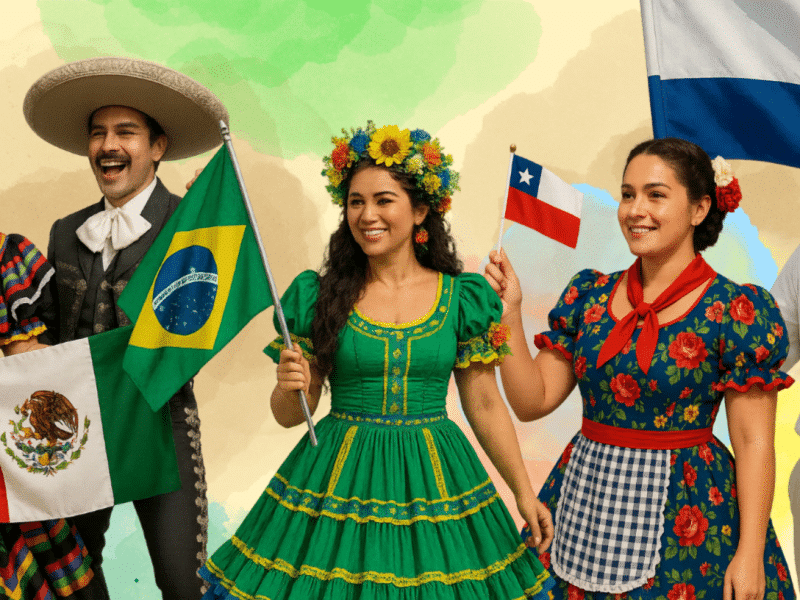Selena Gomez, Eugenio Derbez, and the Weight of Language in Representation
So here we are, still having to defend the idea that representation is not a one-size-fits-all issue. It’s complicated, it’s messy, and yes, it’s exhausting. But that’s the reality of what it means to be a U.S. Latino in a world that constantly tries to define us on its own terms.

Why this story goes beyond one performance to questions of belonging and identity
Originally published in The Latino Newsletter–reprinted with permission.
I thought I did enough on Monday for The Latino Newsletter when citing the recent back-and-forth between Mexican actor Eugenio Derbez and Selena Gomez over her Spanish in the film Emilia Pérez, which hauled in 10 Golden Globe nominations.
I guess not because it’s now Thursday, and my social media feeds are still active with reactions to the news.
Let’s put aside the fact that I am not one to keep propping up another narco film, no matter the impressive Golden Globe news. Something struck a chord, and it still is.
The crux of it all lies in the weight we place on language as a marker of identity and belonging. Derbez’s comment about Gomez’s Spanish being “indefensible” touched a nerve not just because it was harsh but because it echoed an ongoing tension: how do we measure authenticity in a community as diverse as ours?
For U.S. Latinos, navigating cultural expectations —from language proficiency to representation— often feels like a no-win scenario. Gomez’s performance has become a flashpoint for a much deeper conversation about what it means to “belong.”
And kudos to Gomez, who responded to Derbez with such class on social media, saying, “I understand where you’re coming from… I’m sorry. I did the best I could with the time I was given. It doesn’t take away from the work and heart I put into this movie.”
So wise.
I really didn’t want to write or say anything else about this but when voices like Lulu Garcia Navarro of The New York Times and Marcela García of The Boston Globe (both good friends whose opinions I value so much) share their thoughts to what I posted, it was important to unpack this a bit more.
“So tired of these kind of attacks,” Lulu replied on Threads and then added the following quote thread:

Lulu Garcia-Navarro (@lulugnavarro) via Threads
“I was floored by his insulting comments. The whole convo was so, so ignorant that I was getting second-hand embarrassment for them,” Marcela said.
So here we are, still having to defend the idea that representation is not a one-size-fits-all issue. It’s complicated, it’s messy, and yes, it’s exhausting. But that’s the reality of what it means to be a U.S. Latino in a world that constantly tries to define us on its own terms. Gomez’s experience reflects a broader truth: we are all navigating the spaces between expectations and realities, and sometimes we don’t get it perfect. That doesn’t mean the effort isn’t valid.
To me, this isn’t just about a single actor or movie. It’s about the stakes of showing up, of trying, of putting yourself in a position where every move can be dissected. Gomez did the work. The heart she brought to it is something worth recognizing, especially in an industry that hasn’t been kind to Latinas daring to take center stage. (For the record, her Spanish didn’t bother me one bit from what I have seen in movie clips and what her character is like.)
The conversation doesn’t end here—it never does.
Take my case. I grew up speaking both Spanish and English in Puerto Rico. When I left the island as a young kid and even with extended return stays to live with my dad, stepmom, and siblings, I lost some of my Spanish but worked hard in college to study the language and pick it up again. I edited Spanish texts in my 20s, and continue to do so. I read countless books and produced thousands of translations over the years. I am comfortable in Spanish and will continue to use it, but that doesn’t make me the decider of who speaks Spanish well or not. (Now, that doesn’t mean I won’t be one to call out when a term or translated word doesn’t land, but that’s just basic communication work.)
That was Derbez’s initial mistake. The language police vibe. We are so past this.
Enough.
I know he apologized, but he still said what he said. As I wrote for MSNBC last year, “if U.S. Latinos truly want to foster a community that is complex and accepting of everyone’s lived experiences, the work to stop language shaming must never end.”
My hope is that we can take this as a reminder to critique with care, to encourage where we can, and to continue pushing for spaces where all of us can see our stories told with depth and honesty.
That’s the work.
And it’s far from over.




